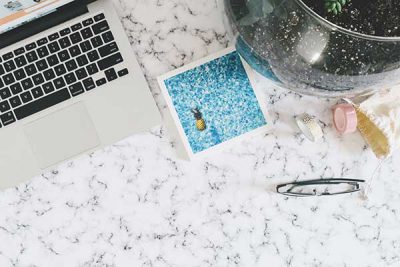Engineered stone is a man-made rock composed of a variety of crushed stones, primarily quartz crystals, that are tightly compacted and then bonded with a polymer resin. Quartz is highly resistant to scratches and chips, measuring a six to seven on the measure of hardness scale (Mohs).
Maintaining engineered stone benchtops requires much less work than natural stone. For day to day cleaning, it’s recommended the surface is wiped down with warm soapy water and a damp cloth. Avoid cleaning the surface with any acid like chemicals, as over time it will take away the high gloss finish of the benchtop’s surface.
Alternate methods may be required to remove tougher materials, such as:
- Chewing gum: place an ice block over gum until it hardens, then remove gum from the surface and wipe the area over to remove any residue.
- Nail polish: Wipe up the excess immediately then wipe over the area with a damp cloth with some nail polish remover. Once the stain is removed, wipe up the nail polish remover with some soapy water quickly, as acetone can cause etching.
- Glue: Scrape of what you can gently with a blade then dampen a cotton ball with some acetone and moisten the glue with the acetone to soften it. Using a plastic putty knife or credit card, gently scrape off the remaining glue and wipe over the area with a damp cloth.
Quartz does NOT have a porous surface; therefore, they do not require sealing/resealing as they age. While quartz is non-porous, the surface is still not entirely resistant to acidic substances; however, the denser nature of engineered quartz slows the rate of damage significantly. Any spills should be wiped up with warm soapy water and a damp cloth to prevent any etching or staining from occurring.
 Engineered stone benchtops are less resistant to heat than other stone surfaces; the surface can crack or chip if exposed to high heat for too long. Engineered stone will tolerate brief exposures to moderately hot temperatures, however prolonged contact with very hot pots, pans, electric frying pans and oven trays directly on the benchtop surface can cause damage. The use of a hot-pad, placemat or trivet to place hot items onto is always recommended to protect your engineered stone benchtop.
Engineered stone benchtops are less resistant to heat than other stone surfaces; the surface can crack or chip if exposed to high heat for too long. Engineered stone will tolerate brief exposures to moderately hot temperatures, however prolonged contact with very hot pots, pans, electric frying pans and oven trays directly on the benchtop surface can cause damage. The use of a hot-pad, placemat or trivet to place hot items onto is always recommended to protect your engineered stone benchtop.
The resins used in engineered stone are not stable under UV light and are therefore not suitable for outdoor applications. Continuous exposure to direct UV light can cause the resin binder to break down as well as causing discolouration of the stone.

